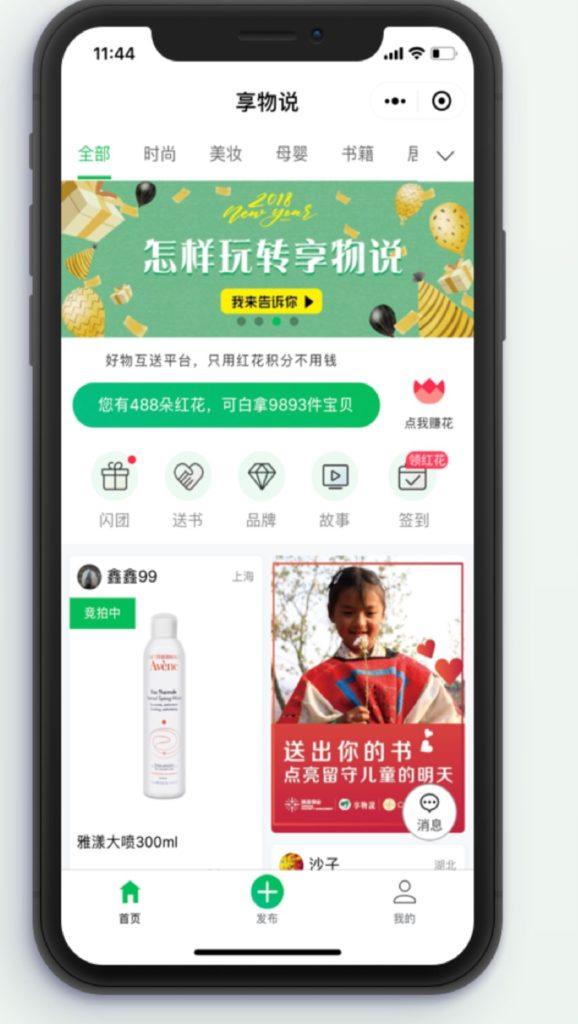Swap your not-so-favorite holiday gifts for things you want or a contribution to a charity!

A digital treasure hunt and socially responsible answer to thrift stores and garage sales that take payment out of the equation.
One interesting start-up platform that I learned about recently is Xiangwushuo, which translates into “Happy Sharing” from Chinese. As an online marketplace and sharing platform, it allows users to swap unused secondhand products. Operating as a payment-free, point-based system, users earn points in the form of “Little Red Flowers” for actions such as referring friends and can also designate the number of points they’d ascribe to the value of the belongings they put up on the platform for exchanging. Other users can then pay with their accumulated points for the products they want to receive on the platform. Launched as a “mini-program” on WeChat, which is similar to a third party app we discussed last week like Farmville that were built on the Facebook Platform, Xiangwushuo has attracted tens of millions of users in China. [1]
With a strong social impact tilt, Xiangwushuo further allows users to contribute their point balance for a monetary match to philanthropic projects throughout China. In addition to the online marketplace, the company also created a “Love Library” to redirect donations of used books to lower income school children in rural communities in China.
To me, this platform is incredibly innovative and value creating because it facilitates the old adage “one man’s throw-aways are another’s treasure” in a unique digital format that for decades had only taken place in brick and mortar thrift stores or through one-off garage sales. It is taking the concept of recycling to a whole new level! Most people buy a lot of random things for which they will probably never use (kitchen and homeware, accessories and clothing are a few categories that I am personally guilty of accumulating) for which they later experience buyer’s remorse. There are also many others who receive gifts they will never personally use (I personally have a drawer of random gag gifts that I really don’t know how to dispose of). Many of these items end up in landfills but not only does this exacerbate already dire environmental problems such as water pollution, but also according to an article in the Global Citizen, countries like the U.S. are rapidly running out of landfill space. [2]
Xiangwushuo capitalizes on the popularity and strong same-side and cross-side network effects of Wechat to create value for every party involved. For users, the platform creates value by leveraging differences in personal preferences and usage contexts to facilitate the exchange of items that one would otherwise never use or throw away for other consumables of higher personal value or contributions to charities backing developments they care a lot about. Additional value is created for charities, who gain from a new source of funding currency and visibility while brands receive additional free publicity in front of eyeballs who are actively scanning the platform to treasure hunt for items they want. The more users that are on the platform putting up items for exchange, the higher the probability that another user will find an item matching their unique preferences.
It is unclear to me how the platform engages in value capture but I would assume that advertising and publicity generation by brands and charities will play a key role. Currently I see some banner ads on the website but with time, I would expect more ads to be integrated natively into the library of items put up for exchange.
Works Cited
[1] Xiangwushuo Website, https://www.xiangwushuo.com/, accessed February 2019.
[2] Joe McCarthy, “The U.S. is rapidly running out of landfill space,” Global Citizen, https://www.globalcitizen.org/en/content/us-landfills-are-filling-up/, accessed February 2019.





Its seem a cool platform which involves a daily problem in our society about “what to do with the things that we don’t want after some time”. At least, in some industries such as the assemble furniture business (Ikea, Steelcase, among others) there are trying to change the business model from “sell” to “rent” the items to the customers for a monthly fee in order that customers have the chances to give back what they bought after some time. Thus, do you think that some companies will move in that direction shrinking the potential business for this platform? On the other hand, the platform facilitates the transaction (take care of the “pick up” and “delivery” between both parties) or just works as an intermediary (connect both parties like “Craiglist” and other apps)?
Built on the principle of 3R (Reduce-Resue-Recycle), the app clearly has a great social and economic value. The idea of using “Little Red Flowers” is also impressive – this would allow user’s focus more on sharing and helping than monetizing. Another way I can think this platform can capture value is monetizing on promoting companies’ sustainability initiatives like ‘buy back’, ‘recycle programs’ etc. on the platform and target the potential customers based on the exchanges they make on the platform (For ex. if someone has bought a printer, the next obvious step is to propose the customer to buy recycled paper from a featured company)
Really interesting post!! This is the first time I see a “purpose marketplace”, which creates value by addressing the recycling problem in such an innovative way. While in this case is clear how network effects come in place to work in favor of all users, I am not that sure about the payment-free feature. Though I recognize it as an aligned tool to the purpose of the platform, I think it might hinder the ability of the whole ecosystem to grow… Would an independent player (i.e. outside the WeChat) be able to build such a large customer base just by establishing a barter-economy platform? Is the purpose attractive enough to afford to limit the value captured by its users?
Thanks so much for this interesting post!! Montreal also has a similar “sharing” platform that taps into a purpose marketplace, although it does not yet have the ability to donate items to charities. While the platform certainly reveals the current consumer attitude that “less is more,” the app (it seems like?) does not appear to work out the logistics behind the donations. In addition, it is slightly different than the Montreal-based platform, which allows people with an excess of a certain item, to post what they have and what they need.